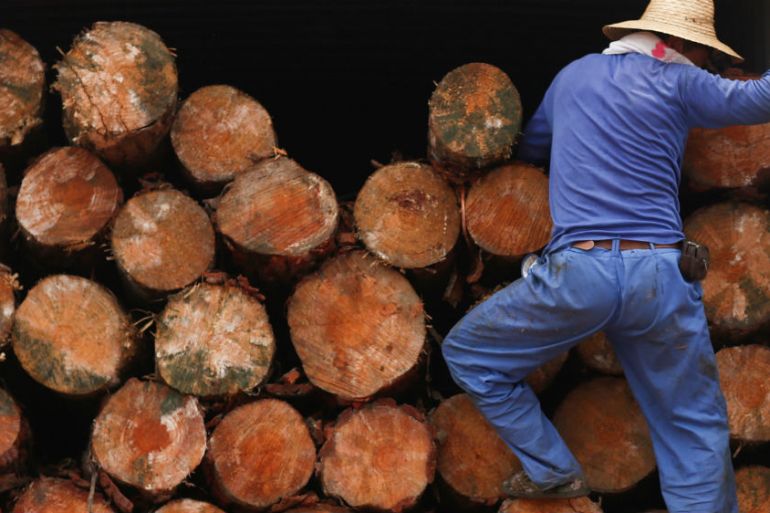Chinese demand fuels Solomon Islands mass deforestation
Global Witness investigation finds forests being felled at 19 times the sustainable rate; vast network of logging roads.

Forests are being felled at an unsustainable rate in the Solomon Islands to meet surging demand for timber from China, according to a new investigation by environmental group Global Witness.
A combination of detailed research, satellite imagery, trade data and on-the-ground and drone photography showed “the shocking pace and extent of the growing degradation of the Solomon Islands’ tropical forests”, Global Witness said in its report into logging in the South Pacific country.
Keep reading
list of 4 itemsTurtles swimming to extinction in Malaysia as male hatchlings feel heat
Could shipping containers be the answer to Ghana’s housing crisis?
Thousands protest against over-tourism in Spain’s Canary Islands
The trade volume of its single largest export commodity surged more than 20 percent to just over three million cubic metres in 2017, according to central bank figures.
Global Witness said that is 19 times more timber than is sustainable. It estimated the country’s annual sustainable yield at 155,000 cubic metres a year, the lowest but most recently calculated of several government and expert analyses, according to Reuters news agency.
‘No questions asked’
The Solomon Islands exports 82 percent of its timber to China, the mainland’s second-biggest source of tropical logs after Papua New Guinea. Together, the two countries supply half of China’s tropical log imports.
“If China continues to buy its wood with ‘no questions asked’, it risks undermining efforts by its trading partners to improve governance, prevent environmental degradation, and achieve the UN Sustainable Development Goals,” Global Witness said in the report Paradise Lost.
“The innovative steps that China is taking to reduce its own carbon emissions will be undermined if it continues to buy so much tropical wood from the Solomon Islands.”
|
|
The risks of illegal logging in the Solomon Islands are so high that any European or US-based importers of uncertified timber would be unlikely to be able to meet their legal requirements without making extensive site visits, the report said. It warned companies importing timber from processing countries, mainly China, could well find themselves buying Solomon Islands’ lumber.
“The scale of the logging is so unsustainable that natural forests will be exhausted very soon if nothing changes,” said Beibei Yin, who led the investigation team.
Logging roads
In 2011, the Solomon Islands’ Ministry of Finance suggested that if logging activities continued at the pace they were ongoing, the country’s natural forests would be exhausted by 2036.
“The Chinese companies which import most of the wood are so significant that if all of them together stop buying there is still a chance to revert back,” Yin told Reuters news agency.
Global Witness said its analysis of satellite imagery showed a web of logging tracks now covered much of the Solomons’ archipelago, putting more than half the country’s lowland areas within one kilometre of a road.
Totalling 12,613km, that road network is twice as long as China’s Yangtze River, the report said. Satellite imagery showed 669km of road above 400 metres, where logging is supposed to be restricted.
The Solomon Islands, an archipelago of some 990 islands, has more than 2.2 million hectares of forest covering about 80 percent of its land area.